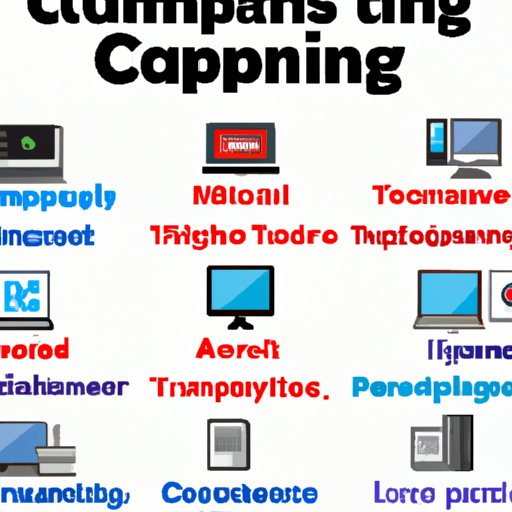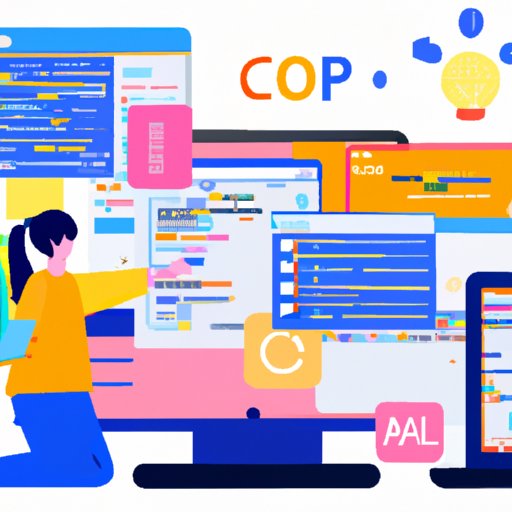Introduction
Computer programming courses are designed to teach students the fundamentals of programming and software development. These courses provide students with the necessary skills and knowledge to develop software applications for various platforms, such as web, mobile, and desktop. In addition, these courses also equip students with the skills required to debug and troubleshoot code, analyze system requirements, and understand program design and algorithms.
Overview of Computer Programming Course
Computer programming courses are an excellent way for students to learn how to develop software applications. Students who take these courses will gain a strong understanding of the fundamentals of programming, such as data structures, algorithms, and software design principles. In addition, they will be able to develop programs that can be used on a variety of platforms, including web, mobile, and desktop.
These courses are typically offered at both universities and technical colleges. They may also be available through online learning platforms such as Coursera or edX. The length of a typical course varies depending on the institution and the specific topic being taught.

Benefits of Taking a Computer Programming Course
Taking a computer programming course offers numerous benefits for students. By learning the fundamentals of programming, students will be better equipped to develop software applications for various platforms. This can give them an edge when applying for jobs in the software industry.
In addition, taking a computer programming course can help students increase their problem-solving skills. By learning how to analyze and debug code, they will be able to identify and fix errors quickly and efficiently. Furthermore, they will gain an understanding of how to optimize code for better performance.

Types of Computer Programming Courses
Computer programming courses come in many different forms. Some of the most popular types of courses include web development, mobile app development, game development, software engineering, database management, and artificial intelligence and machine learning.
Web Development
Web development courses are designed to teach students how to create websites and web applications. These courses typically cover topics such as HTML, CSS, JavaScript, and other web development technologies. Students will learn how to design and build websites, as well as how to add dynamic functionality.
Mobile App Development
Mobile app development courses teach students how to create apps for smartphones and tablets. These courses usually cover topics such as mobile user interface design, iOS and Android development, and mobile app testing. Students will learn how to create apps that are optimized for different devices and platforms.
Game Development
Game development courses teach students how to create video games for various platforms. These courses usually cover topics such as game design, 3D modeling, animation, and programming. Students will learn how to create engaging and immersive games that can be played on multiple platforms.
Software Engineering
Software engineering courses teach students how to design, develop, and maintain software applications. These courses typically cover topics such as software architecture, object-oriented programming, and software testing. Students will learn how to create efficient and reliable software applications.
Database Management
Database management courses teach students how to store, organize, and retrieve data. These courses usually cover topics such as database design, SQL, and NoSQL. Students will learn how to create efficient and secure databases that can handle large amounts of data.
Artificial Intelligence and Machine Learning
Artificial intelligence and machine learning courses teach students how to create intelligent systems that can learn from data. These courses usually cover topics such as natural language processing, computer vision, and deep learning. Students will learn how to create systems that can make decisions and solve complex problems.

Course Objectives and Outcomes of a Computer Programming Course
The objectives of a computer programming course vary depending on the type of course being taken. Generally speaking, the goal of these courses is to equip students with the necessary skills and knowledge to develop software applications. Specifically, students should expect to:
Develop Fundamental Programming Skills
The primary objective of a computer programming course is to teach students the fundamentals of programming. This includes topics such as data structures, algorithms, and software design principles. Students should expect to learn how to write code and develop software applications.
Understand Program Design and Algorithms
Computer programming courses also teach students how to design and implement algorithms. This includes topics such as search algorithms, sorting algorithms, and graph algorithms. Students should expect to learn how to design efficient algorithms that can solve complex problems.
Analyze System Requirements
Computer programming courses also teach students how to analyze and interpret system requirements. This includes topics such as requirement gathering, system modeling, and software architecture. Students should expect to learn how to identify and interpret system requirements.
Use Debugging Tools and Techniques
Computer programming courses also teach students how to use debugging tools and techniques. This includes topics such as code tracing and logging, breakpoints, and exception handling. Students should expect to learn how to identify and resolve errors in their code.
What to Expect When Taking a Computer Programming Course
When taking a computer programming course, students should expect to attend lectures, participate in labs, and complete homework assignments. Lectures will cover the basic concepts of programming, while labs will provide hands-on experience with coding. Homework assignments will give students a chance to practice their coding skills.
Lectures
Lectures are an important part of any computer programming course. During lectures, students will learn the fundamentals of programming, such as data structures, algorithms, and software design principles. The instructor will provide examples and explanations to help students understand the material.
Labs
Labs are an essential part of any computer programming course. During labs, students will have the opportunity to put their knowledge into practice by writing code and developing software applications. The instructor will provide guidance and support throughout the lab sessions.
Homework Assignments
Homework assignments are another important part of any computer programming course. During homework assignments, students will be given the opportunity to practice their coding skills. The instructor will provide feedback on the assignments to help students improve their skills.
Challenges of Computer Programming Courses and How to Overcome Them
Computer programming courses can be challenging for some students. Here are some of the common challenges and how to overcome them.
Lack of Understanding of the Basics
One of the biggest challenges for students is a lack of understanding of the basics. To overcome this challenge, it is important to dedicate time to studying and practicing the fundamentals of programming. Additionally, it is helpful to ask questions during lectures and labs to clarify any misunderstandings.
Difficulty with Problem Solving
Another common challenge for students is difficulty with problem solving. To overcome this challenge, it is important to practice problem solving regularly. Additionally, it is helpful to consult resources such as textbooks and online tutorials to gain a better understanding of the concepts.
Struggling with Time Management
Time management can be a challenge for some students. To overcome this challenge, it is important to set realistic goals and stay organized. Additionally, it is helpful to take breaks throughout the day to ensure that you are not overworking yourself.
Conclusion
Computer programming courses are a great way for students to learn how to develop software applications. These courses provide students with the necessary skills and knowledge to develop applications for various platforms. In addition, they equip students with the skills required to debug and troubleshoot code, analyze system requirements, and understand program design and algorithms.
Taking a computer programming course can be a rewarding experience for those who are willing to put in the time and effort. However, there are some challenges associated with taking a computer programming course, such as a lack of understanding of the basics, difficulty with problem solving, and struggling with time management. Fortunately, these challenges can be overcome with dedication and hard work.
(Note: Is this article not meeting your expectations? Do you have knowledge or insights to share? Unlock new opportunities and expand your reach by joining our authors team. Click Registration to join us and share your expertise with our readers.)
